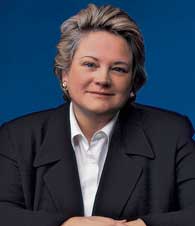|
Executive Interviews: Interview with Tamara J Erickson on Managing Troubled Times
March 2009
-
By Dr. Nagendra V Chowdary
First, a word about nGenera
Innovation Network.
nGenera specializes in business
innovation. Through our people and
platform, we help the world’s leading
companies turn big ideas into high
impact results for their most
important relationships: their
customers and their talent. Business
leaders and their organizations trust
nGenera for the following offerings:
- Original, "over the horizon"
research investigating how a new
business model of global
collaboration is emerging as the
foundation for competitiveness,
growth, and sustained success.
|
|
- Executive development, education,
and advisory services providing
insight, inspiring innovation, and
building momentum for productive
change.
- A collaborative software
platform and unique on-demand
applications that integrate with and
extend existing systems for rapid
execution and sustainability of
solutions.
The nGenera Innovation Network
drives the reinvention of expertise
required for the next-Generation-era.
-
You have been both a respected,
McKinsey Award-winning author
and a popular and engaging
storyteller. Your compelling views of
the future are based on extensive
research on changing demographics
and employee values and, most
recently, on how successful
organizations work. How do you
describe the current economic times
arising out of the US financial crisis.
Is it correct to say that the crisis is a
derivative of derivatives (financial)?
The current crisis cannot be
attributed to any one event or set of
activities. The derivatives market
played an important role. However,
many forces came together to
contribute to the current situation,
including government policy and
consumer behavior. Nor is it accurate
to point solely to the US. As recent
actions have shown, financial
institutions in Europe and other parts
of the world participated in the
practices that contributed to the nowglobal
crisis. -
What lessons should countries,
companies and individuals draw
from this unprecedented crisis? Is it
correct to say that this is a Great
Depression II?
The conditions today are different
from those at the time of the Great
Depression, and the response of
governments and other bodies thus
far have been based on lessons
learned fromthose times. As a result,
it is not a direct repeat of the
difficulties of that time. It’s a serious
situation – but probably one that
deserves its own name as a distinct
occurrence. Most of the lessons learned center on
the need to take an activist approach,
including occasionally trying some
unorthodox actions which are
necessarily in part untested and rely
on trial and error, such as brokering a
shotgunmarriage for Bear Stearns and
rescuing insurance giant AIG in
exchange for an ownership stake.
Overall the lessons emphasize the
need to flood the financial system
with liquidity by lowering interest
rates, opening the Federal Reserve’s
lending facilities to a variety of
institutions, and buying up certain
kinds of commercial loans. Because
the crisis is of a global nature, leaders
are working together to coordinate
rescue efforts such as cutting rates
and supporting banks around the
world. -
You, along with Ken Dychtwald
and Robert Morison argued that
unprecedented shifts in the age
distribution and diversity of the
global labor pool are underway and
companies ignore these shifts at great
peril, in your 2006 book, Workforce
Crisis: How to Beat the Coming
Shortage of Skills and Talent. Did you
notice any proactive steps fromany of
the companies to bridge that obvious shortage of talent, especially from
Japanese companies, since the book is
written?
The fastest and most effective
approach for many companies is to
extend the option of continuing to
work to older employees – in other
words, to ‘retire’ the idea of forced
retirement. Many companies have
put more flexible policies in place,
allowing employees a range of
options for continuing to work –
often on a reduced-time basis.
1.
Troubled Times Case Study
2. ICMR
Case Collection
3.
Case Study Volumes
|
